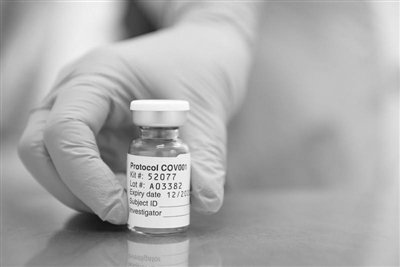December 10th local time, several American media reported that the U.S. Food and Drug Administration (FDA) Vaccine Advisory Group recommended approval of the emergency use authorization for the coronavirus vaccine developed by Pfizer Pharmaceutical Co., Ltd. in cooperation with German biotechnology companies.
According to the New York Times, citing people familiar with the matter, the FDA is expected to approve the emergency use authorization of the vaccine on the 12th, but according to the relevant requirements, the announcement may be postponed to the 13th or later.
The epidemic in the United States will still face cruel challenges.
The U.S. Capitol Hill reported that although Pfizer’s first coronavirus vaccine may be approved in a few days, it will not be widely available in the coming months. This means that the epidemic in the United States will still face cruel challenges for some time to come. Travel and gatherings at the end of the year could lead to a spike in cases and higher infections.
The CDC director Robert Redfield believes that the vaccine approved this week will have no impact on the direction of the epidemic in the United States for the next 60 days.

In an interview with CNN, Fauci, an infectious disease expert in the United States predicted that if everyone can get a successful vaccination against the novel coronavirus, the United States may return to normal next summer or early autumn.
Vaccination across the United States faces multiple challenges
In November, the Washington, D.C. Department of Health surveyed 3,000 local residents to see how many would be willing to get the coronavirus vaccine. Nearly 50% of minority Americans say they won’t get the coronavirus vaccine, according to the survey.
Bloomberg reported that minority communities have been hurt by racial prejudice, which not only has a negative impact on their treatment, but also exacerbates their distrust of the coronavirus vaccine.

In addition, many rural areas or underserved communities with medical infrastructure have difficulty in ensuring cold chain storage of vaccines, and people who are homeless or without medical insurance may also be left out in vaccine distribution. Bloomberg said that the epidemic prevention and control measures in the United States are disorderly, and subsequent vaccine storage and distribution also face huge challenges.
In a survey conducted in November, the news survey website ProPublica found that most states did not have enough plans to store or distribute vaccines. Differences in geographical location and community have the potential to further hinder vaccinations for different populations, causing the novel coronavirus to continue to spread uncontrolledly, with deadly consequences. The current surge in infections across the United States is putting pressure on hospitals in many regions.

More notably, communities lacking hospitals or pharmacies may be at the bottom of vaccine distribution, meaning that high-risk communities may not be able to obtain vaccines in time. Bloomberg commented, “We may know what the procedure is for the initial vaccine distribution, but we don’t necessarily know what the future vaccine distribution will be like. In areas hit hard by the pandemic, mass vaccinations remain a long and uncertain road.”



